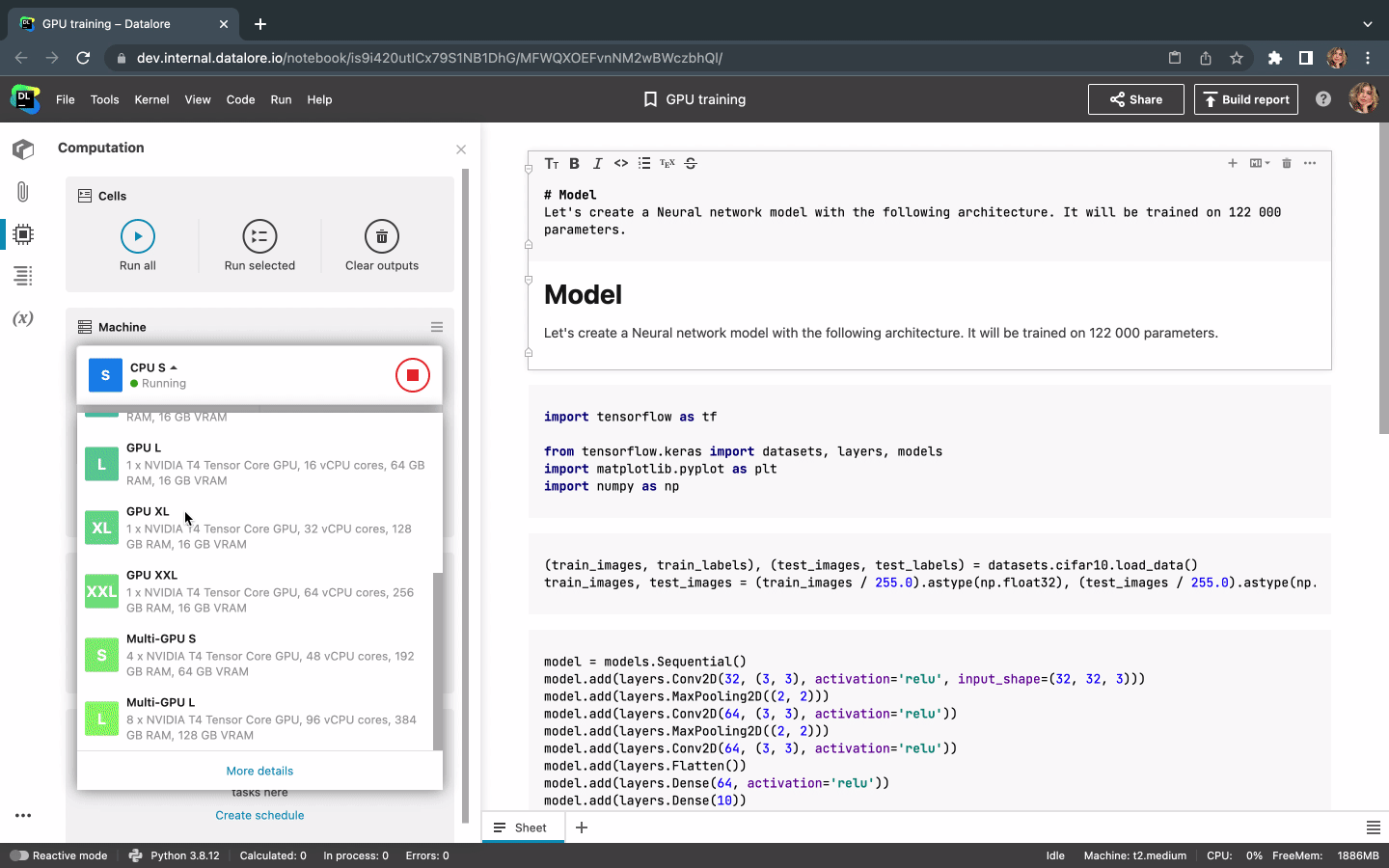Datalore
Collaborative data science platform for teams
New in Datalore 2023: Run API and a Number of Performance Improvements
Since January 2023, we have rolled out a number of new features for our Community and Professional users. The list includes the long-awaited Datalore Run API, a more robust reactive kernel, a whole array of Powerful CPUs and GPUs, Datalore credits for Professional users, and a number of performance improvements.
Datalore Run API
The all-new Datalore Run API makes it possible to run a Datalore notebook or republish a report with an API call. This feature is an addition to scheduled runs, and it allows you to trigger rerunning a notebook on-demand from external apps and internal Datalore notebooks. More information on how to use the API can be found here.

Quality and performance improvements
The Report Builder and Reactive mode have been improved, along with scheduled runs and data connections.
- Cloud bucket connections are now available at the workspace level, similar to database connections. Learn more.
- The Report Builder now works more smoothly for notebooks that have more than 100 cells with complex outputs.
- Cells in the Report Builder are now presented in the same order as in the corresponding notebook.
- Notebook viewers now have a better view of the content of attached databases and cloud storages.
- Collaborators will lose their access to a notebook if you revoke the public access link.
- There is now the option to stop a Scheduled run from the User | Running machines dialog.
- Metric cells now allow you to compare two float numbers.
- It is now possible to export the entire content of a workspace as a .zip archive.
- Terminal sessions will be reactivated when your notebook wakes up.
A more robust reactive kernel
- Notebooks and reports with Reactive mode switched on now support intermediate cells that can’t be checkpointed because of open connections or devices.
- We introduced a new way of handling checkpointing errors. In case of an error, Datalore notifies the user that the cell has not been checkpointed, while allowing further evaluation. Datalore now uses the nearest valid checkpoint for re-evaluation.
Addition of Powerful CPUs and GPUs
We have introduced eight new high-performance CPU and GPU computing machines to the list of options for Datalore Professional, up to 96GB of RAM on CPU XXL and the power of up to 8 Nvidia T4 GPUs.

To get access to the new machines, go to Account Settings | Billing plans. You’ll need to upgrade your account to Datalore Professional!

Under the hood, for each new notebook computation Datalore launches a new AWS EC2 machine. By default, a spot machine is launched, which helps keep the computation price as low as possible. As part of the feature roadmap, we plan to introduce a choice between spot and on-demand types of machines to make the cost of each machine more transparent for users.
Datalore Credits
Many of our users have reported that they need only large CPU machine time, while others need only GPU time. In order to make computation options more flexible, we introduced Datalore credits for Professional users to spend on the machines that they prefer.

With the Professional plan, users will get 12 free Datalore credits monthly, enough to cover 120 hours of computation on CPU L and 20 hours of computations on GPU S. As before, the Professional plan will also include 750 hours of computations on CPU S to ensure access to your work, even if you run out of Datalore credits.
Datalore credits and more powerful CPUs and GPUs will help you get more out of your Datalore Professional subscription.
How to use Git with Datalore
If you or your team develop a collection of Python scripts or a pip-compatible package stored in Git, you can now conveniently access this repository from your notebooks in Datalore.
Datalore Enterprise release
We have introduced Datalore Enterprise 2023.1, which brings a number of quality and performance improvements. Read on to learn more about what’s new and improved.
How TrueLayer Uses Datalore for Secure Collaboration
TrueLayer is a global open banking platform that makes it easy for anyone to build better financial experiences.
Your Datalore team
Subscribe to Datalore News and Updates






